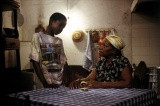
The story of the war veteran and "hero" Vitório, which unfolds in Angola two years after thirty years of civil war. This documentary-style feature film also describes the life of other figures in the capital city of an African country devastated and traumatised by war.


The story, set in Angola’s capital Luanda, unfolds two years after the end of protracted civil war, when the devastated country is slowly beginning to get back on its feet. Vitorio is a war veteran who lost his leg and is trying to start a new life. Not only is he having trouble finding work, but now someone has stolen his artificial limb and the medal he received for courage. We also follow the stories of other people around him: 12-year-old Manuo who lost his parents in the war, lives with his grandmother and wanders the streets at night with a gang of adolescents; the prostitute Maria Barbara, who lost her son in the war; the young teacher Joana and her wellsituated fiancé. The documentary feel of this raw situation in many ways is reminiscent of Italian neorealism. The feature film does much to reflect the specific atmosphere and colour of an African city gradually recovering from its post-war trauma.
97 min / Color, 35 mm
Director Zézé Gamboa
/ Screenplay Carla Baptista
/ Dir. of Photography Mario Masini
/ Music David Linx, Diedrik Wissels
/ Editor Anna Ruiz
/ Producer Fernando Vendrell
/ Cast Oumar Makéna Diop, Milton Coelho, Patrícia Bull, Neusa Borges
/ Contact f for film
Zézé Gamboa (b. 1955, Luanda, Angola) began as the director of the Telejournal and Information Programs Dept. for the Angolan TV channel TPA (1974-80). In 1984 he gained a degree in sound engineering at Néciphone (SOM) in Paris. Documentary filmography: a look at Angolan society through music Mopiopio, Breath of Angola (1991), an image of an Angolan dissident seen through two warring sides Dissidence (Dissent, 1998). Short docs.: Burned by Blue (Queimado pelo Azul, 1999), My Shoes (2001), The Disquiet of Pessoa (2002). The film The Hero (2003), Gamboa’s feature debut made two years after the end of 30 years of civil war in Angola, is seen as an example of African neorealism. It won a number of awards at international festivals: Best Film at Sundance 2005 and the winner at Los Angeles’ Pan African Festival in 2005.
f for film
11 rue Riquier, 27 200, Vernon
France
Phone: +33 2 325 405 96
E-mail: [email protected]
First-hand brews throughout the year.
Be among the first to learn about upcoming events and other news. We only send the newsletter when we have something to say.